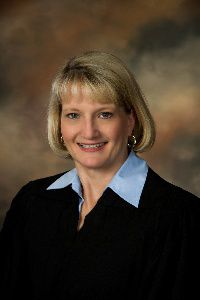Caroline H. Lennon
Caroline H. Lennon is a First Judicial District judge for Scott County, Minnesota. She was appointed to this position by Governor Tim Pawlenty (R) on October 7, 2008.[1] She ran unopposed for re-election in 2016.[2]
Biography
Lennon received her B.A. from St. Olaf College in 1985 and her J.D. from the William Mitchell College of Law in 1989. She began her career in 1988 as a law clerk in the Hennepin County Attorney's office. In 1990, she became an assistant Hennepin County attorney. She held this position until she joined the district court in 2008.[1]
Elections
2016
Minnesota held general elections for local judicial offices on November 8, 2016. A primary election occurred on August 9, 2016. The filing deadline for candidates wishing to run in this election was May 31, 2016.[3] Incumbent Caroline H. Lennon ran unopposed in the Minnesota 1st District, Position 25 general election.[2]
| Minnesota 1st District, Position 25, General Election, 2016 | ||
|---|---|---|
| Candidate | Vote % | Votes |
| 100.00% | 234,263 | |
| Total Votes | 234,263 | |
| Source: Minnesota Secretary of State, "Unofficial Results Tuesday, November 8, 2016: Results for All Judicial Races," accessed November 9, 2016 | ||
2010
- See also: Minnesota judicial elections, 2010
Lennon was re-elected after running unopposed.[4]
Selection method
- See also: Nonpartisan election of judges
Judges of the Minnesota District Courts are all chosen in nonpartisan elections to serve six-year terms. Candidates compete in primaries, from which the top two contestants advance to the general election. Sitting judges must run for re-election if they wish to serve additional terms. While party affiliation is not designated on the ballot, incumbency is. Sitting judges who reach the age of 70 while in office are allowed to serve until the last day of their birthday month.[5]
The chief judge of each district court is selected by peer vote for a two-year term.[5]
Judges of all courts are required to be "learned in the law" and under 70 years old.[5][6]
See also
External links
Footnotes
- ↑ 1.0 1.1 Official biography of Judge Lennon
- ↑ 2.0 2.1 Minnesota Secretary of State, "2016 State General Election Candidate Filings: Judicial Offices," accessed June 1, 2016
- ↑ Minnesota Secretary of State, "2016 Election Dates," accessed December 7, 2015
- ↑ Minnesota Secretary of State, State Offices
- ↑ 5.0 5.1 5.2 American Judicature Society, "Methods of Judicial Selection: Minnesota," archived October 2, 2014
- ↑ Office of the Revisor of Statutes, "2006 Minnesota Statutes," accessed July 30, 2014
Federal courts:
Eighth Circuit Court of Appeals • U.S. District Court: District of Minnesota • U.S. Bankruptcy Court: District of Minnesota
State courts:
Minnesota Supreme Court • Minnesota Court of Appeals • Minnesota District Courts • Minnesota Problem-Solving Courts • Minnesota Tax Court • Minnesota Workers' Compensation Court of Appeals
State resources:
Courts in Minnesota • Minnesota judicial elections • Judicial selection in Minnesota




